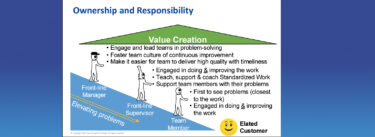Human beings have a natural inclination to categorize and sort in order to make sense of the world.
Sesame Street famously asks our children, “One of these things is not like the others, one of these things just doesn’t belong.” These sorting activities are important for brain development and mathematical reasoning and from an evolutionary perspective for survival.
As adults we continue to sort and categorize as a way to create order out of a sea of information and to make sense of the world. We sort objects and plants and experiences. We sort people and ideas and options. We sort, sort, sort. And in doing this, we protect ourselves, but we also severely limit ourselves.
I am certainly guilty of this. I’m inclined to look for and find patterns. These patterns can be useful, or at least, they can appear to be useful. But they can also be limiting and erroneous, because sometimes those patterns cover up what is really significant.
Last spring, I attended and spoke at a Lean Summit. It was an inspiring gathering of 345 government employees working to adapt lean to governments all across Canada. They are doing amazing work and had powerful insights and incredible stories to tell of real culture change, improved quality, flow of value and in many cases savings. All the good things we aim for!
At one session, someone asked, “Assuming Lean is just another fad, what is going to come next?” This question is really about pattern seeking and sorting. They had sorted Lean into the category of improvement tools along with many other improvement methods. Now they were looking for the pattern to predict the next in the series. I understand the inclination to do that.
In Washington State government, we’ve been adapting Lean to government operations to improve the value we deliver to all Washingtonians and to make public service deeply gratifying. Results Washington is a nation-leading state government performance system that integrates performance management, continuous improvement, and cross-agency collaboration, and aims to make government more responsive, data-driven and human-centered.
Like most people on a Lean journey, at times we have had this penchant for sorting and categorizing Lean too. We’ve asked ourselves, “What is Lean?” and “How is Lean different from other improvement efforts?” And our team members have said, “Are we doing Lean or six sigma or continuous improvement or change management or human-centered design or nudging or??? I thought we were doing Lean?”
As people, every time something new comes along we all tend to pick it up and turn it over to examine it and ask ourselves, what is it? Which box does this go in? Does this fit in the Lean box or is it something else?
We do this to make sure we understand what’s going on. We do this so we can have a shorthand way of making sense of our day-to-day world, and to increase our likelihood of success. We do this because we are tired and don’t have extra energy to spend on nonsense. We do this to make it through the day. We do this because we are afraid, afraid of failing or looking foolish or being wrong or missing out.
We come up with answers that sort Lean conveniently into categories for easy understanding and storage. Lean is a useful set of improvement tools. We can hang Lean right over there. No, Lean is a culture. It belongs over here. No, Lean is a management system. Wait, I thought Lean is all about people? No, Lean is all about process. Lean is technical. No, Lean is social. Lean is a business strategy. Lean is a philosophy.
Sigh.
When we make Lean about only one of these things we limit ourselves. We embrace one truth but deny many others. So what if we were to resist our natural inclination to sort and just stop categorizing Lean? What if we were to stop making these choices and instead, what if we were to say “Yes!” to them all?
What if we were to embrace Lean as a human centered philosophy, the biggest category of all? Jim Benson shared this definition of Lean with me a couple years ago, and this has provided the most useful starting point for understanding and engaging all the different aspects of Lean. A philosophy is fundamentally a way of thinking about the nature of the world and reality that guides our behavior. If we begin by seeing Lean as a way of thinking about the world with people at the center, then we set a really big table so to speak with an amazing smorgasbord of options for understanding Lean.
Let’s keep going. Once we see Lean as a human-centered way of thinking about the world, we can also embrace Lean as a set of values and principles that make up a culture. These include:
· deeply respecting people,
· continuously improving out of regard for people,
· not wasting time and resources because that dishonors those who give them,
· listening to, including, and developing people,
· providing quality for and flowing value to the customers we serve, and
· giving workers the chance to create value which honors the life energy of their work.
But there’s more than that. We can also embrace Lean as both a management strategy and an operating system that help us act on those values and principles coherently and as a routine way of working day in and day out.
And those routines need to be practical. Routines need tools. Really good tools. So we can embrace Lean as tools too. Tools from Toyota. Tools from other Lean organizations. Tools from Deming and from Six Sigma. Tools that support PDSA and tools that support DMAIC, and tools that do both because they aren’t that different. Tools from change management. From the application of behavioral economics. From design thinking. And even tools and methods we have yet to invent. Because we can create new Lean tools too. Nothing says we can’t.
Because there’s one thing Lean should not be. Lean should not be religion.
So whatever category or box you’ve put Lean in, open it up, break it down, and say “Yes” to all the ways of thinking about Lean, Lean without limits.





